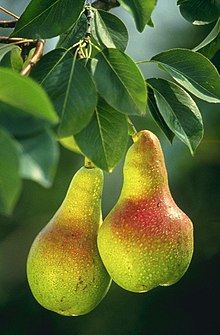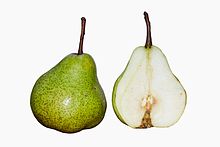| Pear | |
|---|---|

| |
| European pear branch with two pears | |

| |
| Pear fruit cross section | |
| Scientific classification | |
| Kingdom: | Plantae |
| Clade: | Tracheophytes |
| Clade: | Angiosperms |
| Clade: | Eudicots |
| Clade: | Rosids |
| Order: | Rosales |
| Family: | Rosaceae |
| Subfamily: | Amygdaloideae |
| Tribe: | Maleae |
| Subtribe: | Malinae |
| Genus: | Pyrus L. |
| Species | |
|
About 30 species; see text | |
Pears are fruits produced and consumed around the world, growing on a tree and harvested in late summer into mid-autumn. The pear tree and shrub are a species of genus Pyrus /ˈpaɪrəs/, in the family Rosaceae, bearing the pomaceous fruit of the same name. Several species of pears are valued for their edible fruit and juices, while others are cultivated as trees.
The tree is medium-sized and native to coastal and mildly temperate regions of Europe, North Africa, and Asia. Pear wood is one of the preferred materials in the manufacture of high-quality woodwind instruments and furniture.
About 3,000 known varieties of pears are grown worldwide, which vary in both shape and taste. The fruit is consumed fresh, canned, as juice, dried, or fermented as perry.